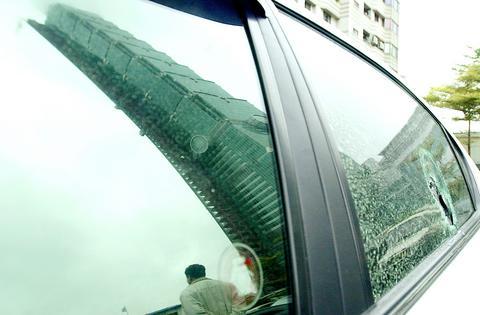More than one million pilgrims from across the country have visited the Taipei 101 Mall since its opening on Nov.14. The world's tallest skyscraper has been characterized as much by its excesses as its successes.
In a sense, this 509m high, 101-story tower, which includes a shopping mall, office space and an observatory, represents Taiwan's economic success and its pursuit of modernization.

PHOTO: CHIEN JUNG-FENG, TAIPEI TIMES
President Chen Shui-bian (陳水扁) described it as a "symbol of Taiwan's progress and prosperity" at the opening ceremony. Taipei Mayor Ma Ying-jeou (馬英九) said that the building represents "Taiwan's identity and world-class quality."
Building towering skyscrapers has almost become a thing of the past in western countries since the Sept. 11 attacks, but the trend has been reversed in Asia, which is home to the world's tallest skyscrapers. Six of the world's ten tallest buildings are located in Asia, and more will be built.
High-rise buildings like the Taipei 101 Mall represent the ideals of Taiwanese and of people in other Asian countries, where skyscrapers are a relatively new sight compared to western countries, said Yeh Ting-fen (葉庭芬), a PhD student of environmental planning at Tokyo University. "It fulfils people's longings emotionally and represents their desire to get on in the world."
Political commentator Poe Ta-chung (
"The completion of the Taipei 101 Mall is like a heart stimulant to Taiwan's people, who have been suffering from the economic recession. It provides an escape for the public," Poe said.
"Seeing a pile of merchandise and finery in this grandiose shopping mall, the public experiences an illusionary happiness, which is a kind of psychological therapy to them," Poe said.
Although officials have boasted that the skyscraper conforms to world-class quality standards and offers a safe environment, a spate of construction accidents at the mall have raised questions about whether the city and the developer can afford the prestige that the world's tallest building brings.
On Friday pieces of metal fell from the 91st floor of the office tower onto the ground around the building, injuring four people.
The public have risked their lives to shop in the mall while the office tower adjacent to it is still under construction.
The tower will be topped in March next year, but the mall has already been opened.
Ma, who kept saying that the city government adhered to the strictest standards in the construction of the skyscraper, has cited the construction law in the city council, saying that there was no law against allowing an unfinished structure to conduct business.
But Friday's accident was not the first.
Several accidents have occurred during the building's construction. Two cranes dropped from the 56th floor in an earthquake on March 31 last year, killing five people and injuring 10. The roof of the shopping mall caught fire twice during the construction, and the escalator of the office tower caught fire in January.
The Taipei 101 Mall has been constructed under a build-operate-transfer (BOT) formula, in which private investors are involved in the construction and operation together with the government. The Taipei City Government rents the land to the investors and has helped eliminate problems during construction.
Fingers have been pointed at the city government, who is playing a dual role as a supervisor and part-owner of the skyscraper.
Chen Wei-jen (
Chen had ordered construction work on the office tower to a halt before the developer, who kept apologizing to the public and the city government, suggested a complete construction plan to the city government.

Alain Robert, known as the "French Spider-Man," praised Alex Honnold as exceptionally well-prepared after the US climber completed a free solo ascent of Taipei 101 yesterday. Robert said Honnold's ascent of the 508m-tall skyscraper in just more than one-and-a-half hours without using safety ropes or equipment was a remarkable achievement. "This is my life," he said in an interview conducted in French, adding that he liked the feeling of being "on the edge of danger." The 63-year-old Frenchman climbed Taipei 101 using ropes in December 2004, taking about four hours to reach the top. On a one-to-10 scale of difficulty, Robert said Taipei 101

Nipah virus infection is to be officially listed as a category 5 notifiable infectious disease in Taiwan in March, while clinical treatment guidelines are being formulated, the Centers for Disease Control (CDC) said yesterday. With Nipah infections being reported in other countries and considering its relatively high fatality rate, the centers on Jan. 16 announced that it would be listed as a notifiable infectious disease to bolster the nation’s systematic early warning system and increase public awareness, the CDC said. Bangladesh reported four fatal cases last year in separate districts, with three linked to raw date palm sap consumption, CDC Epidemic Intelligence

Two Taiwanese prosecutors were questioned by Chinese security personnel at their hotel during a trip to China’s Henan Province this month, the Mainland Affairs Council (MAC) said yesterday. The officers had personal information on the prosecutors, including “when they were assigned to their posts, their work locations and job titles,” MAC Deputy Minister and spokesman Liang Wen-chieh (梁文傑) said. On top of asking about their agencies and positions, the officers also questioned the prosecutors about the Cross-Strait Joint Crime-Fighting and Judicial Mutual Assistance Agreement, a pact that serves as the framework for Taiwan-China cooperation on combating crime and providing judicial assistance, Liang

US climber Alex Honnold left Taiwan this morning a day after completing a free-solo ascent of Taipei 101, a feat that drew cheers from onlookers and gained widespread international attention. Honnold yesterday scaled the 101-story skyscraper without a rope or safety harness. The climb — the highest urban free-solo ascent ever attempted — took just more than 90 minutes and was streamed live on Netflix. It was covered by major international news outlets including CNN, the New York Times, the Guardian and the Wall Street Journal. As Honnold prepared to leave Taiwan today, he attracted a crowd when he and his wife, Sanni,